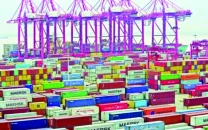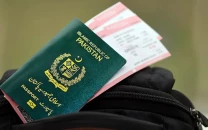Pakistan survives global financial crisis

Pakistan survives global financial crisis
The performance of Pakistan’s economy in the fiscal year 2008-09 had been greatly influenced by macroeconomic imbalances created in 2007-08. Persistent inflationary pressures and the weak performance of key sectors made it a demanding year. Add high global commodity prices to the mix and the dual impact shocked the economy with a gaping trade deficit, high inflation and crash in the value of the rupee.
For the first time in years, the economy will have to seek external funding to support balance of payments. The cost of protection against a default in Pakistan’s sovereign debt trades at 1,800 basis points. With the step up in operation against militants, an acute energy shortage and resource constraints, the domestic environment remained detrimental, threatening macroeconomic fundamentals. As a result of these pressures, the economy has not only been impacted with regard to overall performance but has also undergone a medium-term shift in policy orientation. Policy intervention has been geared towards stabilising the economy, with a targeted recovery phase which began in fiscal year 2009-10.
Inflation remains the biggest threat to the economy, jumping to more than nine per cent in 2005 before easing to 7.9 per cent in 2006. The Economist Intelligence Unit (EIU) estimates that inflation should drop back to single digits this year and that growth should rise to over five per cent annually by 2011. While this is less than the seven per cent average over the past five years, it would represent a step towards overcoming the present crisis where growth is a mere four per cent.
The effects of the global slowdown have been transmitted through the trade balance with a slowdown in global demand and a fall in commodity prices with varying effects on capital account and a significant reduction in private inflows to Pakistan.
The global crisis has impacted Pakistan’s external debt through the depreciation of the US dollar against major international currencies leading to significant worldwide losses. A receptive debt policy is currently being formulated in order to monitor, assess and take steps to mitigate the currency risks.
On the other hand, the low interest rate environment amid the ongoing crisis has provided Pakistan with an opportunity to capitalise on lower servicing costs of its existing stock of floating rate external debt.
After recognising the economic challenges, the government and State Bank of Pakistan (SBP) initiated an aggressive macroeconomic stabilisation programme with the help of International Monetary Fund (IMF) to put the economy back on track.
The crisis has also allowed the government and SBP to undertake some key reforms in the domestic public debt market. The government has started announcing quarterly targets for treasury bill auctions. The decisions on cut-off rates for auctions are now based on target and more importantly this cut-off is now decided by the Ministry of Finance instead of the central bank. The SBP is now aiming to adopt a transparent liquidity management framework including the announcement of an explicit corridor for money market interest rates which will be made public.
As part of monetary policy management, the SBP has also introduced a number of reforms in the foreign exchange market. Importantly, the SBP decided to gradually phase out the provision of foreign exchange for importing oil. Now the inter-bank market is meeting the foreign exchange demand for the import of furnace oil.
The impact of the global crisis has so far been very limited but a few credible threats still remain. The external sector still faces multiple threats in the form of a further reduction in international demand and secondly, a recent rally in international commodity prices as investors seek refuge could potentially reverse the gains registered in the current account balance. With regard to external financing if current conditions in international markets continue, the government will have to increase reliance on funding from multilateral and bilateral agencies.
Dealing with the crisis is difficult for Pakistan due to fiscal constraints. Balance of payments weaknesses forced the country to resort to an IMF standby arrangement that imposed further conditions on the budget. Subsidies on wheat, electricity, fertiliser and oil had to be phased out which in turn increased the inflationary burden on consumers. While there are some social safety nets at the federal and provincial levels, access to these has generally become more difficult.
Published in The Express Tribune, June 28th, 2010.


















COMMENTS
Comments are moderated and generally will be posted if they are on-topic and not abusive.
For more information, please see our Comments FAQ